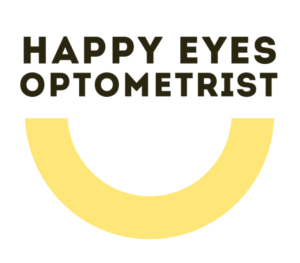Helping young eyes grow healthy and strong
Good vision is essential for learning, development, and everyday activities. Because children often don’t realise they have vision problems, regular eye examinations are the best way to make sure their eyes are healthy and seeing clearly. At Happy Eyes Optometry (Surrey Hills), we provide comprehensive, gentle eye exams tailored for children of all ages, from preschoolers to teenagers.
Why children’s eye exams matter
- 1 in 5 children has an undetected vision problem.
- Kids may not notice their eyesight is blurred — they just adapt.
- Vision problems can affect reading, concentration, school performance, and confidence.
- Early detection means early treatment, preventing long-term issues.
Book a Children’s Eye Test Online
Signs your child may need an eye test
- Squinting, rubbing eyes or tilting head when reading
- Complaints of headaches or tired eyes
- Sitting too close to the TV or holding books very near
- Difficulty concentrating or avoiding near work
- Excessive blinking or eye rubbing
- Eyes turning inwards or outwards (squint/strabismus)
- Falling behind at school or avoiding reading
What happens during a children’s eye exam?
Our optometrists create a calm, friendly environment so kids feel comfortable. Tests are age-appropriate and may include:
- Checking visual acuity (clarity of sight)
- Measuring eye muscle coordination and tracking
- Assessing depth perception and 3D vision
- Detecting focusing ability and near/far vision balance
- Examining eye health (front and back of the eye)
- Screening for common conditions like myopia (short-sightedness), hyperopia (long-sightedness), astigmatism, amblyopia and strabismus
Common conditions we manage in children
- Myopia (short-sightedness): Increasingly common in school-aged kids. We provide evidence-based myopia control treatments, including Ortho-K lenses, myopia control glasses, and atropine therapy.
- Amblyopia (lazy eye): Reduced vision in one eye that needs early treatment for best results.
- Strabismus (eye turn): Misalignment of the eyes that may affect depth perception and vision development.
- Focusing and tracking issues: Which can impact reading fluency and learning.
How often should kids have their eyes tested?
- First check: Around age 3–4 years
- School age: Every 1–2 years, or sooner if problems are suspected
- Teenagers: Every 1–2 years, especially if using digital screens heavily
Tips for healthy young eyes
- Encourage outdoor play (at least 2 hours a day helps reduce myopia risk)
- Take regular breaks from screens and close work (20-20-20 rule)
- Ensure good lighting for reading and study
- Wear sunglasses outdoors for UV protection
- Keep up with regular eye checks even if no symptoms are noticed
Our approach
We take the time to explain results clearly to both parents and children, and provide practical solutions — whether that’s glasses, contact lenses, or a treatment plan. Our goal is to give your child the best possible start to a lifetime of healthy vision.
Book Your Child’s Eye Test Today
Frequently asked questions
Are eye tests covered by Medicare?
Yes — children’s eye examinations are bulk-billed to Medicare at Happy Eyes Optometry.
Can my child wear contact lenses?
Yes — even young children can be successfully fitted with contact lenses, especially for sports or myopia control. We’ll guide you on safe options.
My child had an eye test at school. Do they still need one?
Yes. School screenings are basic and can miss many important issues. A full eye exam with an optometrist is more thorough.
Give your child the best vision for learning and life
Book a friendly, comprehensive children’s eye exam with our team today.
Would you like me to also add a shorter, parent-friendly version (about 2–3 paragraphs) that could sit on the Services page, with a “Learn More” link pointing to this full version?
